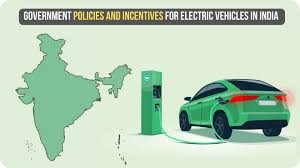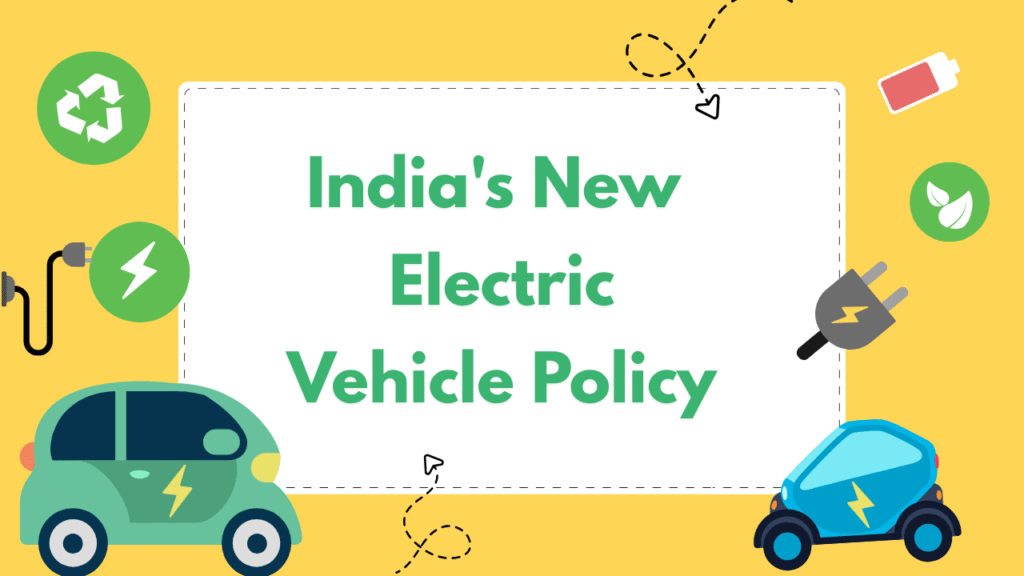India has launched a new electric vehicle (EV) policy aimed at boosting domestic manufacturing and attracting global investment in the EV sector.
India’s New Electric Vehicle Policy

India has taken a significant step toward becoming a global leader in electric vehicle (EV) manufacturing with the launch of its new Electric Vehicle Policy in March 2024, with applications set to open in June 2025. This policy aligns with the “Make in India” initiative, aiming to bolster domestic manufacturing, attract global automakers, and support India’s ambitious climate goals of reducing emissions intensity by 45% by 2030 and achieving net-zero emissions by 2070. By offering reduced import duties and substantial investment incentives, the policy seeks to transform India’s automotive landscape, create jobs, and reduce environmental impact. This blog post explores the details of this policy, its related developments, future implications, and how it positions India in the global EV market.
Key Features of the New EV Policy
The new policy, approved by the Government of India, introduces several strategic measures to accelerate EV adoption and manufacturing:
- Reduced Import Duties: Global automakers can import up to 8,000 EVs annually priced at USD 35,000 or above at a reduced customs duty of 15%, down from the previous 70-100%. This applies to Completely Knocked Down (CKD) units and is valid for five years.
- Investment Requirements: Companies must commit to a minimum investment of INR 4,150 crore (approximately USD 500 million) to establish manufacturing facilities in India within three years. They are also required to achieve 50% Domestic Value Addition (DVA) within five years, ensuring significant local production.
- Bank Guarantees for Accountability: Non-compliance with DVA or investment criteria triggers enforcement of bank guarantees, ensuring transparency and commitment from manufacturers.
- Focus on High-Value Segments: The policy targets premium EVs, protecting domestic players in the volume segment while inviting global giants like Tesla to establish a presence.
- Support for Infrastructure: While the policy emphasizes manufacturing, it builds on existing initiatives like the Faster Adoption and Manufacturing of (Hybrid and) Electric Vehicles (FAME) Phase II, which allocated INR 10,000 crore for EV subsidies and charging infrastructure development.
This policy follows a series of earlier initiatives, including the National Electric Mobility Mission Plan (NEMMP) and FAME I and II, which laid the groundwork for EV adoption through subsidies, tax incentives, and infrastructure development. The Electric Mobility Promotion Scheme (EMPS) 2024 further supports affordability by reducing upfront costs for consumers.
Related Developments
The new EV policy is part of a broader ecosystem of regional and global developments shaping India’s electric mobility landscape:
- State-Level Policies: States like Tamil Nadu, Uttar Pradesh, and Delhi have introduced complementary EV policies. Tamil Nadu targets 30% of its bus fleet to be electric by 2030 and has established an “EV Cell” to streamline implementation. Uttar Pradesh offers 100% road tax exemptions for EVs and subsidies for charging infrastructure. Delhi aims for 25% of new vehicle registrations to be EVs by 2024, focusing on public charging points in residential complexes.
- Battery Swapping Initiatives: In February 2023, India introduced a draft battery swapping policy to address long charging times, particularly for two- and three-wheelers, which dominate the Indian EV market. The policy standardizes battery sizes, enhances safety protocols, and explores subsidy schemes for swapping stations, drawing inspiration from China’s success in this area.
- Global Trade Dynamics: The discovery of 14,000 tonnes of lithium in Karnataka highlights India’s potential to reduce reliance on imports from countries like China, a major producer of lithium and rare earth elements. However, further exploration is costly and environmentally challenging, prompting India to pursue trade pacts with Australia to secure critical minerals.
- Renewable Energy Integration: With coal currently dominating India’s electricity generation, the increased EV demand necessitates cleaner energy sources. The government is investing in renewable energy to reduce the carbon footprint of EV charging, aligning with the net-zero goal by 2070.
These developments reflect a coordinated effort to create a robust EV ecosystem, addressing supply chains, infrastructure, and consumer adoption barriers.
Future Implications
The new EV policy has far-reaching implications for India’s citizens, industries, politics, and global market positioning:
Short-Term Effects
- Consumer Benefits: Reduced import duties will make premium EVs more affordable, potentially increasing adoption among affluent consumers. However, the focus on vehicles priced above USD 35,000 may limit immediate benefits for the mass market, where two- and three-wheelers dominate.
- Industry Growth: Domestic manufacturers like Tata Motors and Mahindra & Mahindra may face increased competition in the premium segment but benefit from technology transfers and partnerships with global players. The policy’s DVA requirement will boost local component manufacturing, creating jobs.
- Infrastructure Development: The push for charging and battery swapping stations will improve urban mobility, particularly for commercial fleets. However, the current ratio of one public charger per 25 EVs remains a bottleneck compared to the global average of one per eight EVs.
- Political Impact: The policy strengthens the “Make in India” narrative, enhancing the government’s image as a driver of economic and environmental progress. However, inconsistent policies or subsidy phase-outs could create uncertainty for automakers and consumers.
Long-Term Effects
- Economic Opportunities: The EV market is projected to grow at a 49% CAGR from 2022 to 2030, potentially reaching annual sales of one crore units and creating five crore direct and indirect jobs by 2030. This could position India as a major EV manufacturing hub.
- Environmental Impact: With transportation contributing significantly to India’s air pollution (e.g., two- and three-wheelers account for 50% of PM 2.5 levels in New Delhi), widespread EV adoption could reduce emissions, provided renewable energy sources are scaled up.
- Global Competitiveness: By attracting global players and fostering innovation, India could emerge as a leader in the EV market, particularly for two- and three-wheelers, which are already a significant export segment.
- Challenges: Dependence on imported components like lithium and cobalt, coupled with limited domestic lithium reserves, poses risks. Over-reliance on subsidies could destabilize the market if phased out prematurely.
Winners and Losers
- Winners: Global automakers like Hyundai and Skoda, who have shown interest in local manufacturing, stand to gain from reduced duties and market access. Domestic startups in battery technology and charging infrastructure will benefit from increased investment. Consumers in urban areas will enjoy cleaner air and lower operating costs.
- Losers: Domestic manufacturers in the premium segment may face short-term competitive pressures. Rural consumers, with limited access to charging infrastructure, may see fewer benefits. Coal-based power plants could face scrutiny as EV demand strains the grid.
Global Perspective
India’s EV policy is part of a global push toward sustainable mobility, but its approach differs from other nations:
- China: China leads the global EV market, with over 11 million units sold in 2024, driven by robust subsidies, mandates, and innovations like battery swapping stations led by companies like CATL. Unlike India, China’s policy emphasizes both consumer subsidies and extensive public charging networks, achieving a 40% year-on-year sales increase. India’s focus on high-value EVs and domestic manufacturing contrasts with China’s broader market approach, but India is learning from China’s battery swapping model to enhance efficiency.
- Norway: Norway, a leader in EV adoption, has achieved high penetration through aggressive tax exemptions and incentives for EV buyers, coupled with heavy taxes on internal combustion engine (ICE) vehicles. Unlike India’s manufacturing-centric policy, Norway prioritizes consumer incentives, resulting in EVs constituting over 80% of new car sales. India’s high import duties and focus on local production reflect a different economic context, prioritizing self-reliance over immediate consumer affordability.
- Global Institutions: The International Energy Agency (IEA) notes that India’s state-level incentives and infrastructure focus complement national ambitions, similar to strategies in Australia and Japan. However, the IEA emphasizes the need for India to tighten fuel economy standards and scale up renewable energy to maximize EV benefits, aligning with global trends toward zero-emission vehicles (ZEVs).
India’s policy stands out for its balance of attracting foreign investment while protecting domestic interests, but it lags behind China and Norway in charging infrastructure and consumer incentives, which could slow adoption rates.
India’s new Electric Vehicle Policy of 2024 marks a pivotal moment in its journey toward sustainable mobility. By reducing import duties, mandating domestic manufacturing, and aligning with climate goals, the policy positions India as an emerging player in the global EV market. While challenges like limited charging infrastructure, import dependency, and policy consistency remain, the potential for economic growth, job creation, and environmental benefits is immense. As India learns from global leaders like China and Norway, its focus on self-reliance and innovation could redefine the future of transportation, making it a key player in the global shift to electric mobility.
Sources:
- Canalys Insights, Drishti IAS, Invest India
- Posts on X
